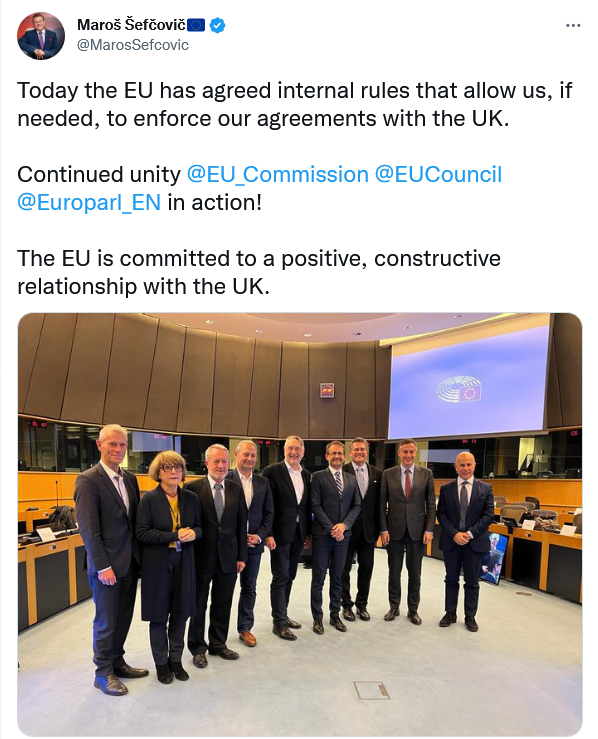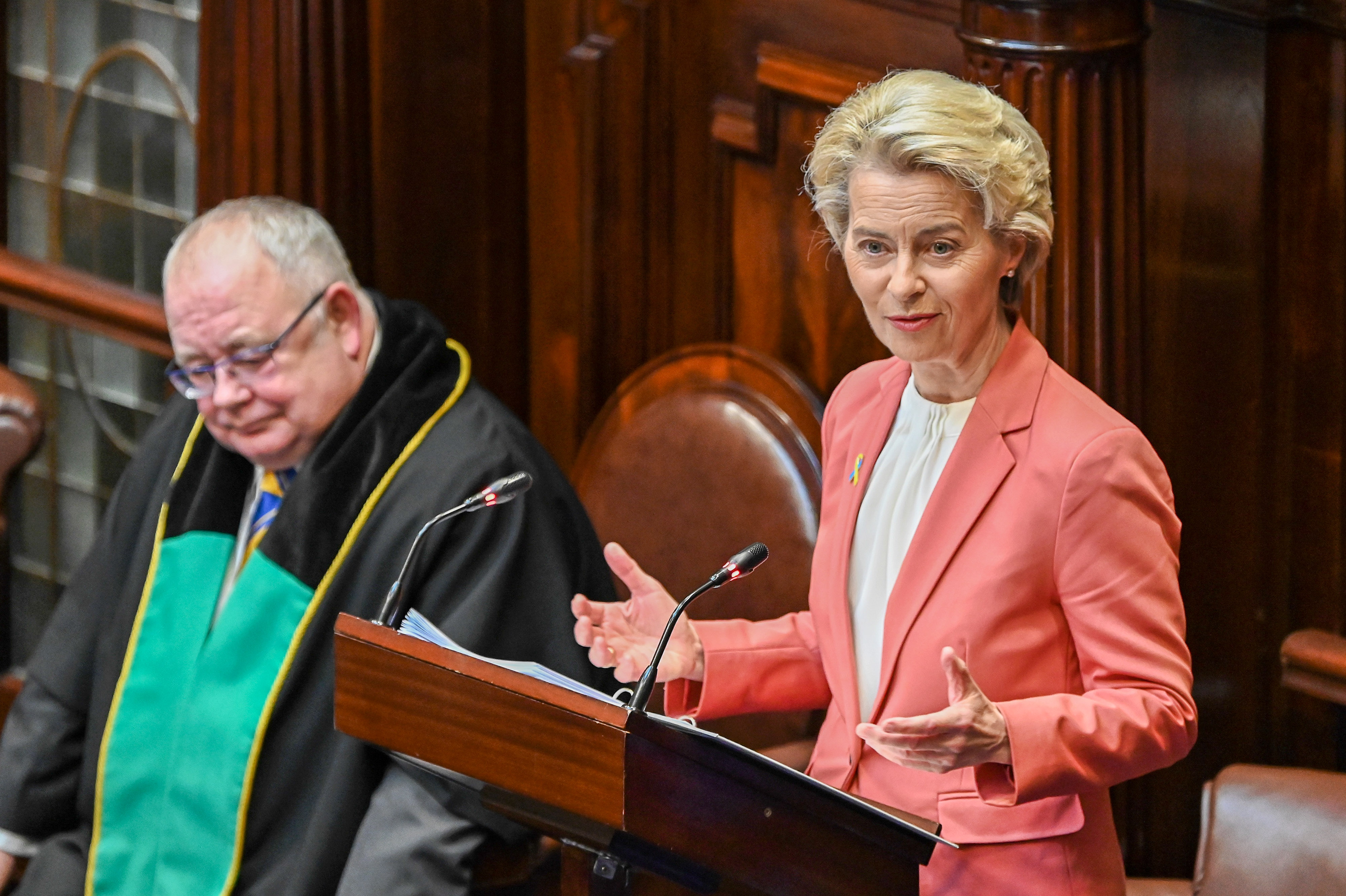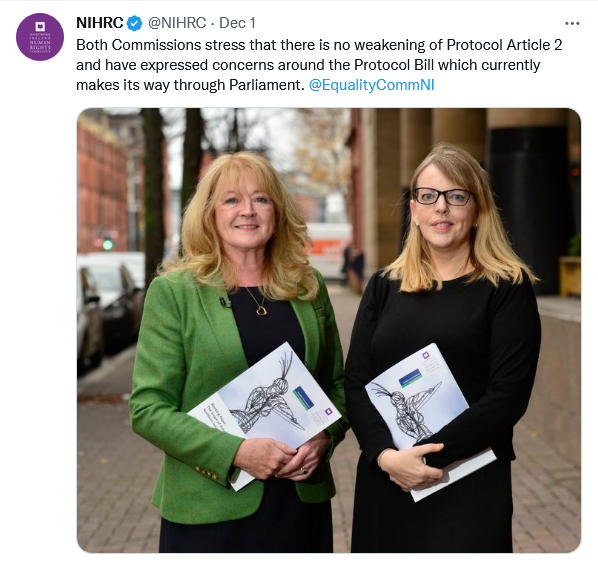Brexit & Beyond Newsletter
5 December 2022
Welcome to the 5 December 2022 Brexit & Beyond newsletter
The European Union has provisionally agreed measures, including trade restrictions, should the UK breach its commitments in the EU-UK agreements. European Commission President Ursula von der Leyen addressed the Oireachtas. The NI Equality and Human Rights Commissions have published an analysis of the scope of Article 2 of the Protocol (a UK Government commitment to protect certain equality and human rights post-Brexit). The Supreme Court has heard a case that the Protocol on Ireland/Northern Ireland breaches the Act of Union and the Northern Ireland Act.
EU’s Brexit enforcement measures
On 30 November, the EU Council and European Parliament reached a provisional agreement on a regulation, which sets out measures for the EU to enforce the Withdrawal Agreement and the Trade and Cooperation Agreement. In the case of a breach, the measures the EU could adopt against the UK include retaliatory trade tariffs, restricting investment activities, and restrictions on aviation. Seán Kelly, a Fine Gael MEP who led negotiations on the European Parliament side, said, “Politically, this regulation is a strong statement of EU unity and readiness to take action if the UK were to breach either agreements, including the Protocol…especially if the British government was to refuse to participate in the dispute-resolution mechanisms provided for.” The text must now be approved by the Council and the European Parliament before being formally adopted.

European Commission Vice-President Maroš Šefčovič’s reaction to the agreement | Source: @MarosSefcovic on Twitter
EU-UK relations
The EU and UK chief negotiators spoke on the phone last week about the ongoing talks on the Protocol on Ireland/Northern Ireland. European Commission Vice-President Maroš Šefčovič tweeted that he had a “good conversation” with UK Foreign Minister James Cleverly. He said the EU is “ready to double down” on its efforts to “find joint solutions for the benefit of all communities in Northern Ireland.” Cleverly stated, “We remain committed to finding a durable solution for the benefit of all.”
Prime Minister Sunak gave his first major foreign policy speech on 28 November. He touched on the UK’s relations with the EU, noting engagement with the new European Political Community. However, he said, “But this is not about greater alignment. Under my leadership we’ll never align with EU law. Instead, we’ll foster respectful, mature relationships with our European neighbours on shared issues like energy and illegal migration to strengthen our collective resilience against strategic vulnerabilities.”
The second meeting of the EU-UK Trade Partnership Committee, which oversees this part of the EU-UK Trade and Cooperation Agreement, was held on 1 December. On the agenda was the EU’s import bans on seed potatoes, UK freeports policy, and the UK Subsidy Control Act. The Committee also considered the UK Government’s Retained EU Law (Revocation and Reform) Bill.
President von der Leyen addresses the Oireachtas
On 1 December, European Commission President Ursula von der Leyen addressed a joint sitting of the Houses of the Oireachtas. She said talks between the EU and UK are “marked by a new, more pragmatic spirit.” She remarked, “By applying common sense and focusing on the issues that really matter in Northern Ireland, I believe we can make progress in resolving the practical issues surrounding the Protocol…but the consequences of Brexit and the kind of Brexit chosen by the UK cannot be removed entirely.” She said a solution must ensure the EU single market continues to function in Ireland and elsewhere.

European Commission President Ursula von der Leyen speaking to the Oireachtas | Source: European Union, 2022
Taoiseach Micheál Martin (Fianna Fáil) expressed his appreciation for the EU’s “unswerving solidarity with Ireland throughout Brexit.” Irish Minister for Foreign Affairs Simon Coveney (Fine Gael) echoed this sentiment, thanking von der Leyen and Vice-President Maroš Šefčovič, for their “tireless work in supporting peace in Northern Ireland, for your continued patience and intelligence and for your willingness to continue to look for solutions to the ongoing issues of concern around the Northern Ireland Protocol.”
President of Sinn Féin, Mary Lou McDonald spoke about the absence of the institutions in Northern Ireland and said, “the Protocol is working. It is necessary to protect the North from the damages inflicted by Brexit. It is supported…by the majority of democratically elected representatives in the North and throughout the island.” She said comments from PM Rishi Sunak on restoring the political institutions and resolving issues around the implementation of the Protocol “are very welcome but they must be matched by action and meaningful talks between the British Government and the European Commission”.
Meanwhile, the Financial Times reports comments from an EU diplomat that “for the first time since Brexit the Irish position is not dictating that of the others.” The paper states that there is concern that Ireland “does not seem to have any contingencies in place if the UK scraps most customs controls under its proposed Northern Ireland Protocol Bill. In such a case the Irish would be asked to monitor goods flowing from Northern Ireland which might then be shipped to the continent.”
Protocol Article 2 - rights, safeguards and equality of opportunity
The Equality Commission for Northern Ireland (ECNI) and the Northern Ireland Human Rights Commission (NIHRC) have published a paper on their analysis of the scope of Article 2 of the Protocol on Ireland/Northern Ireland. In Article 2, the UK Government committed to ensuring that there would be “no diminution of rights, safeguards or equality of opportunity” (as set out in the Good Friday Agreement) as a result of the UK leaving the EU. This means, for example, that rights such as freedom of religion and political thought, and equal opportunity, must continue to be protected in Northern Ireland after Brexit. Some of these rights are underpinned by EU law. The Commissions are tasked with overseeing the implementation of Article 2. For example, the Commissions have raised concerns about a number of provisions in the Nationality and Borders Bill, which may infringe obligations arising from the EU Trafficking Directive.

Chief Commissioner of the Equality Commission Geraldine McGahey and Chief Commissioner of the Northern Ireland Human Rights Commission Alyson Kilpatrick | Source: @NIHRC on Twitter
ECNI Chief Commissioner Geraldine McGahey said, “While the Courts will be the ultimate decision maker, our joint Working Paper explores the potential scope of this important commitment by the UK Government and will be a useful tool, not just for us, but for any individual or organisation considering what Article 2 is likely to mean in practice.” NIHRC Chief Commissioner Alyson Kilpatrick said the paper’s launch comes “against a backdrop of real threat to human rights, not least by the proposed reform of the Human Rights Act.” She said Article 2 is “an essential safeguard” in the protection of human rights and equality. The appendix to the paper sets out the EU law which it considers to fall within scope of the Article 2 commitment.
In relation to the UK Government’s plan to ‘sunset’ retained EU law by the end of 2023, the paper states “particular care should be taken by the NI Executive and UK Government when repealing or amending retained EU law to ensure it does not result in a diminution of rights, safeguards or equality of opportunity protections contrary to Protocol Article 2.”
The Lords Sub-Committee on the Protocol has written to the Government about the Northern Ireland Troubles (Legacy and Reconciliation) Bill in relation to Article 2, referring to analysis from the NIHRC which argues that the Bill’s provisions depart from minimum standards required under the EU Victims’ Directive, which the Government has recognised as falling within the scope of Article 2.
European Parliament reports on Withdrawal Agreement
The European Parliament Committee on Constitutional Affairs has published a draft report on the Implementation of the EU-UK Withdrawal Agreement. The reports states that the first three years of the implementation of the Withdrawal Agreement “have been tarnished by the UK’s continuous breaches of its commitments under the Protocol.” The Committee “strongly regrets the UK’s lack of political will and failure to act in good faith and in compliance with its commitments under the Protocol; regrets, in particular, the lack of support given to the EU staff in charge of monitoring customs checks in the Irish Sea, the insufficient access to UK customs data and the successive unilateral grace periods that have undermined border checks, in clear breach of the Protocol.” It calls on the UK Government to immediately withdraw the Northern Ireland Protocol Bill and “fully implement the agreements that it has signed.” The Committee welcomes proposals made by the European Commission and “expresses its complete support for the legal initiatives launched by the Commission in order to ensure the full implementation of the Withdrawal Agreement.”
Supreme Court Protocol case
On Wednesday, the Supreme Court began hearing the case brought by unionist politicians Jim Allister, Kate Hoey, and Ben Habib, who argue the Protocol on Ireland/Northern Ireland breaches the Act of Union and the Northern Ireland Act. The BBC has an article with background on the case. Government lawyer Tony McGleenan KC told the Supreme Court, "the idea that there has been a de facto termination of the union is not a tenable proposition". He said there was a "modest disapplication, subject to a democratic process, mandated by parliament" of the Acts of Union. Mr McGleenan also said, "It remains the case that any engagement between the government and the EU on the terms of exit from the EU are non-justiciable matters. They relate to the conduct of foreign affairs; and are in the realm of politics, and are in nature entirely unsuited to determination by a court on a judicial review application." For the appellants, John Larkin KC said, "The Protocol, taken as a whole and when one looks at some of its individual provisions in-depth, undoubtedly conflicts with Article 6 of the Acts of Union and we say this is acknowledged by the respondent”. Mr Larkin said the Protocol had "fundamentally changed" Northern Ireland's position in the UK, in a way that was "incompatible with the guarantee" provided in the Northern Ireland Act. A ruling from the court is expected sometime next year.
Other news
- Dr Lisa Claire Whitten and Professor David Phinnemore of QUB have written an article, ‘On the Legislative Complexity to Come: Reflections on what the Northern Ireland Protocol Bill and the Retained EU Law Bill could mean for Northern Ireland’.
- The think tank UK in a Changing Europe has published an article on the Single Electricity Market in Ireland and Northern Ireland. It considers the potential challenges and complexities for the energy market posed by the lack of a NI Executive; Brexit and the NI Protocol; UK and EU carbon border adjustment mechanisms; and UK legislation in the form of the NI Protocol Bill, and the Retained EU Law Bill.
- On 29 November, the Scottish Parliament debated and voted on a motion - the Retained EU Law Bill “threatens vital environmental and health standards and protections built up over 47 years of EU membership, creates enormous uncertainty for workers and businesses, and undermines devolution, and should, therefore, be scrapped by the UK Government.” The vote passed by 84 to 29.
- The Lords Common Frameworks Scrutiny Committee has received a response from the Minister with responsibility for the Union and Constitution, Felicity Buchan. She states “The Government has not committed to retain all REUL [Retained EU Law] covered by Common Frameworks. It has however publicly committed to follow the processes set out in Common Frameworks when approaching reforming REUL covered by a Common Framework.”
- The Scottish Parliament Information Centre has published a blog on the challenge of scrutinising the Scottish Government’s commitment to align with EU law. The Constitution, Europe, External Affairs and Culture Committee requested research setting out all the significant EU legislation which comes within the scope of the Scottish Government’s commitment to continued EU alignment, produced by Dr Lisa-Claire Whitten of Queen’s University Belfast. The Committee has highlighted that the Scottish Government should provide more information, both about the scope of its commitment to alignment, and about how such decisions are taken.
- Anton Spisak of the Tony Blair Institute for Global Change has published a paper, ‘Fixing Brexit: A New Agenda for a New Partnership With the European Union’. It calls for the restoration of trust with the EU (including sorting out the Protocol), the development of a new domestic Europe strategy, and for the UK Government to revisit the Trade and Cooperation Agreement.
- The Commons Library has published a briefing on the Financial Services and Markets Bill. The Bill would implement post-Brexit changes in the UK’s regulation of financial services.




